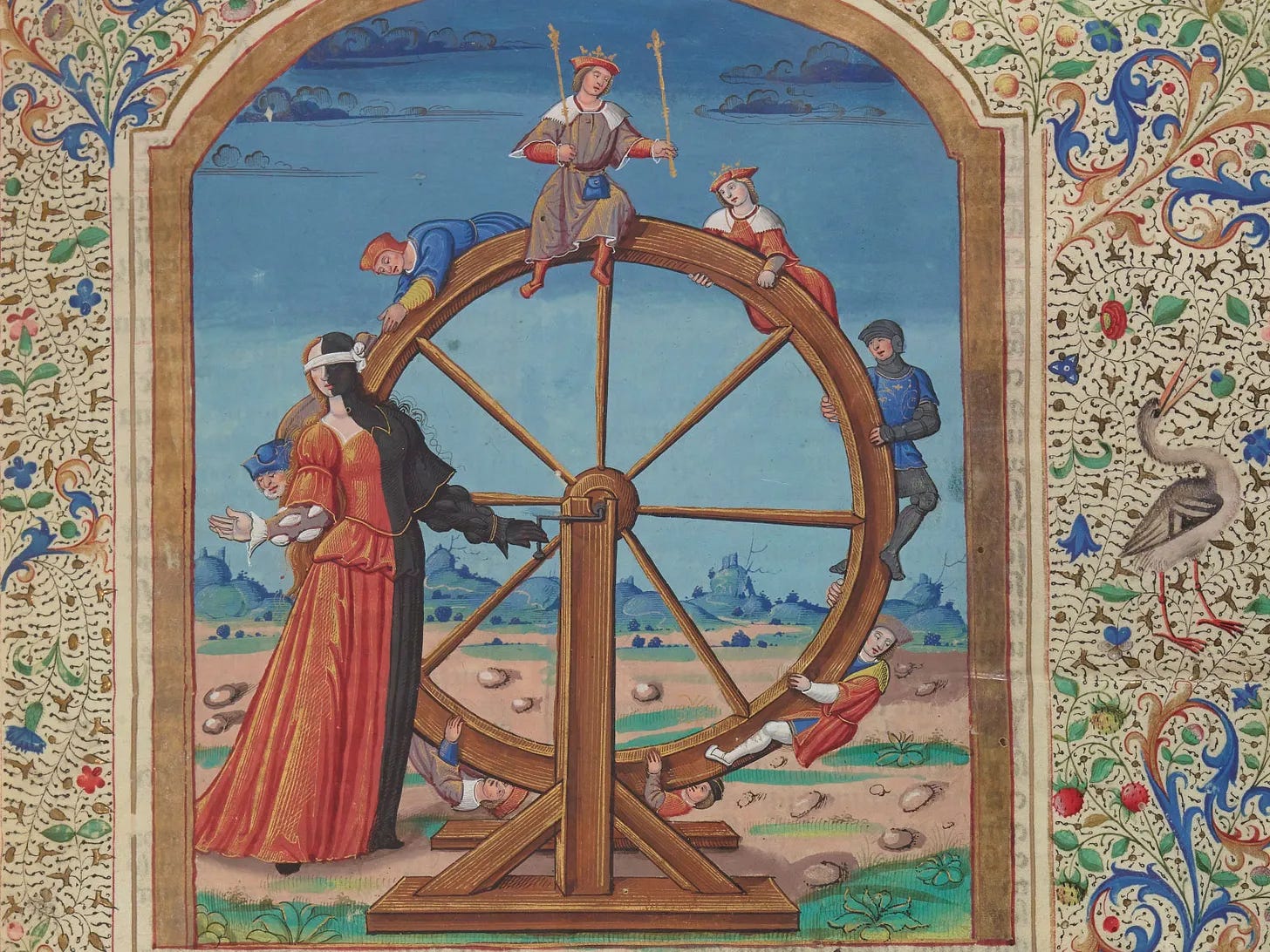A spiritual journey with Boethius: part 2
The Lies of Fortune. Sarah-Jane Murray continues to guide us through the dialogue of Lady Philosophy and Boethius.
Boethius, Book 2: The Lies of Fortune
Boethius cries out against the injustice of the Wheel of Fortune, that ancient goddess who brings us up high, only to delight in causing us to fall even lower when we least expect it.
Lady Philosophy does not coddle him. She listens, and then seems almost amused.
“You’re surprised?” she asks. “Don’t you know how Fortune works?”
Boethius has been deceived, she says, not by politics or by his enemies, but by something more subtle: his misguided belief that Fortune can ever be stable. Why would he be surprised that Fortune is inconstant? It’s in her nature. We are fools for placing our trust in her, instead of something better.
All the things we foolishly strive for in life belong to Fortune. Her wheel spins on, lifting one person up, throwing another down. To build our lives upon her gifts is to build on shifting sand. Were we not born into the world naked, without anything? In that case, what has Fortune really taken away at all?
It’s a hard truth. But it’s freeing, too.
The problem is not that we’ve lost everything, but that we’ve mistaken all of these things we amass—from material possessions to power and recognition—for our foundation. None of them can bring us true happiness. Fleeting delight, maybe, but not happiness that endures.
Lady Philosophy calls Boethius back to something deeper than status or circumstance: the pursuit of the true Good. Do not praise what you can lose, she warns. And do not mourn it too deeply when it’s taken.
Her words cut like a surgeon’s blade.
We can all relate to this. The world tells us that we must strive and achieve, as if earthly success means security. Then one day, the job goes away. The bank account empties. Fair weather friends are nowhere to be found. We feel betrayed by life, when maybe we should feel awakened. Because the gifts of Fortune were never the point.
Book 2, Part 1:
Book 2, Part 2:
Book 2, Part 3:
Boethius, Book 3: The Search for Happiness
Lady Philosophy does not leave Boethius in despair. The real work has only begun. It’s now time to help him remember what true happiness is, and where it can be found.
First, she holds up a mirror to our desires. Every human being wants happiness, she says, but we chase it in all the wrong places. We think we’ll be happy if we’re rich, powerful, admired, surrounded by pleasure, or recognized with awards or high offices. And yet, one by one, Lady Philosophy exposes each of these paths as false.
Wealth promises security, and yet the more we have, the more we fear losing it.
Power seems to offer control, but it offers no protection from sorrow or death.
Fame depends on what others think, and their opinions are fragile and easily manipulated.
Pleasure fades and leaves us emptier than before.
Honour, whether by noble birth or through a high position, does not make a person good, because no office bestows virtue. It is the person who bestows it to the role.
None of these things are evil in themselves. But when we treat them like our ultimate purpose and build our lives upon them, they become traps that will always disappoint us.
So where does that leave us?
Lady Philosophy reminds Boethius of something he once knew. The true Good—the one that is the source of all joy, beauty, and purpose—is found only in the Creator. God is the Good. He is the fountain from which all other goods flow, and our one true source of happiness.
True happiness, Lady Philosophy teaches, is about rightly ordering our hearts.
Book 3, Part 1:
Book 3, Part 2:
Book 3, Part 3:
Click here for part 3, books 4 and 5.
Written and produced by The Greats Story Lab™, lead by Dr Sarah-Jane Murray who is a tenured Professor at Baylor University in Austen, and their Head Imagineer - Courtney Becker. Their goal is to help a new generation of people engage with some of the greatest stories ever told using new media or as they have coined edumedia. The Greats Story Lab™ has been nominated and winners of 18 juried awards including the gold Tellys. Sarah-Jane Murray is herself Emmy nominated and has been lauded in the Times Literary Supplement for her work on the 3 volume; The Moralized Ovid (D.S. Brewer, 2023), with co-translator Dr Mathieu Boyd.

